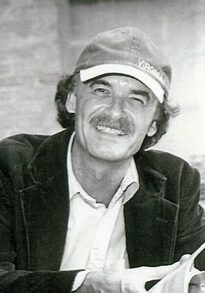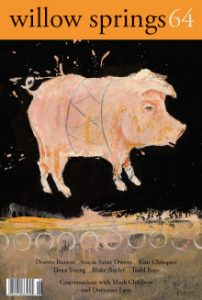
About John Hodgen
John Hodgen is married, with two daughters. He is Visiting Professor of English at Assumption College in Worcester, MA. He is the author of Grace (University of Pittsburgh Press, 2006), winner of the 2005 AWP Donald Hall Prize in Poetry; Bread Without Sorrow (Eastern Washington University Press, 2001), winner of the Balcones Poetry Prize; and In My Father’s House (Emporia State University Press, 1993), winner of the Bluestem Award from Emporia State University in Kansas. He is the winner of the 2005 Ruth Stone Poetry Prize from Hunger Mountain (Vermont College), and the 2005 Foley Poetry Prize from America Magazine. He also won the Chad Walsh Prize in Poetry for the best poems submitted to Beloit Poetry Journal in 2008, and author of Heaven and Earth, to be published by University of Pittsburgh Press in 2010.
A Profile of the Author
Notes on “Witness”
“Witness” grew out of a trip to New Orleans a year after Katrina. A good place for poets. There was that extra element in everything that happened, something alive and conflicted in every gesture and smell and sound, that cultural crossroad resonating with the reverberations of deep tragedy and that need to heal and find how to move on. Each busker, preacher and street dancer seemed aware that death was still in the air, as it always is, lingering somehow. Each song was a little more needed, each drink tasted just a bit better, and each word seemed a little more desperate and necessary.
The moment was just what it was, a bright, angry college kid suddenly erupting at a preacher in the French Quarter, just snapping, unable to contain himself, seeing in the man with the bullhorn a target for all his wrath. It seemed to occur in slow motion, a boozy explosion that might have gone unseen at first, yet filled with that sudden rippling violence as his friends dove in to pull him away. It was all there, the street a tableau, a modern morality play, the French Quarter, the place we go to lose ourselves, suddenly peopled with a preacher reminding us that we shouldn’t be doing that, and a young man saying that that’s the exact reason we come there. Each espoused his own religion, each saw his own deep truth, and each stirred up emotions and visions of the world as he saw it. For a moment it was possible to see each one as Jesus.
Notes on Reading
If Katrina were coming again, I’d grab the following: everything by Shakespeare; everything by Keats, including the letters; everything by John Donne; James Agee’s A Death in the Family and Let Us Now Praise Famous Men, with the unforgettable Walker Evans photographs; Willis Barnstone’s Modern European Poetry, where I discovered Lorca and Machado, and the Russians Mayakovsky, Yevtushenko, and Voznesensky; Hayden Carruth’s anthology of 20th century American poets, The Voice That is Great Within Us; Bly’s edition of Neruda and Vallejo: Selected Poems; two books by Frank Stanford, who loved Lucinda Williams and then shot himself, You and Crib Death, both out of print now from Lost Roads Press; Anne Sexton’s The Awful Rowing Toward God (which I let someone borrow and never got back); Carolyn Forche’s The Country Between Us, just for “The Colonel,” which I still teach every year; Philip Larkin’s High Windows; Billy Collins’ Picnic, Lightning; anything by Chris Howell; and B. H. Fairchild’s The Art of the Lathe. Great book.
Then I’d go back, water up to my neck, for Salinger’s Catcher in the Rye and Nine Stories. I’d grab Huck Finn, Sound and the Fury, Waiting for Godot, Gatsby, Farewell to Arms, To the Lighthouse, my daughter’s Jeweler’s Eye for Flaw, and Hello, I Must Be Going, and the collected screenplays of Charles Bogle, a.k.a. W. C. Fields. Then I’d climb Frost’s birch tree and wait for FEMA, happy as A. Pismo Clam.


